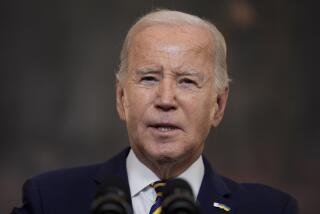Treaty: Bountiful Blame
- Share via
Partisan rhetoric has grown particularly shrill and abusive in the wake of the Senate’s defeat of the Comprehensive Test Ban Treaty, producing more heat than illumination. Americans have a right and need for better.
President Clinton and Vice President Al Gore accuse Senate Republicans, who voted overwhelmingly to reject the treaty, of neo-isolationism and endangering global stability. But if the treaty to ban underground nuclear tests is as important to U.S. security and leadership as Clinton asserts, then why didn’t he go all-out in the three years since it was signed to mobilize public opinion behind it? Why did the treaty remain essentially ignored and all but invisible until a few weeks ago, when it was suddenly identified as vital to American interests?
Republicans justify their vote against the treaty by citing its flaws and uncertainties. But if the treaty would, as they insist, jeopardize maintenance of the U.S. nuclear arsenal and fail to inhibit potential nuclear aggressors, then why did the Republicans not long ago hold open hearings to expose those flaws and risks and--no less important--to propose how they could be fixed? Senate GOP leaders never tried to make a coherent case against the treaty in public. They instead let it gather dust, treating a pact signed by more than 150 countries as just another legislative item submitted by a president they dislike and distrust.
The maneuvering around the debate and vote on the treaty brought glory to no one. Democrats, looking to next year’s campaign, tried to embarrass the Republicans by demanding a vote on the treaty, confident that none would be held. When Majority Leader Trent Lott (R-Miss.) shattered that calculation, Democrats were caught miserably unprepared. The result was Clinton’s most humiliating foreign policy defeat.
Is the crushing of the test ban treaty a further deliberate step back from U.S. global responsibilities? Certainly it fits a regressive pattern that includes the failure to pay U.N. dues, the House’s refusal to support the air war in the Kosovo campaign and almost mindless cuts in what has been anything but a generous foreign aid budget. How much of this is due to bald partisanship? All lame-duck presidents have problems with Congress, and Clinton, given his personal history, is lamer than most. But what’s going on is clearly more than just personal.
Republican complaints that the United States is overcommitted internationally reflect some reasonable concerns, as well as--note Pat Buchanan’s daffy ideas about World War II and what the United States should be doing now--a mind-set shaped by illusion, ignorance and wishful thinking. It’s the reasonable concerns--whether U.S. troops have been sent to too many places, whether we are shouldering burdens others could properly handle--that merit sober debate. Congress no longer appears to be an arena where thoughtful dialogue on foreign policy can take place. But a presidential campaign beckons, offering a forum where reasoned discussion of contentious issues should be demanded.
Now, if only that can be made to happen.
More to Read
Get the L.A. Times Politics newsletter
Deeply reported insights into legislation, politics and policy from Sacramento, Washington and beyond. In your inbox twice per week.
You may occasionally receive promotional content from the Los Angeles Times.









